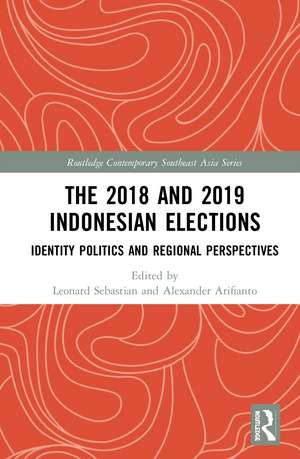The 2018 and 2019 Indonesian Elections: Identity Politics and Regional Perspectives: Routledge Contemporary Southeast Asia Series
Editat de Leonard Sebastian, Alexander Arifiantoen Limba Engleză Hardback – 16 oct 2020
This book is an up-to-date study addressing contemporary Indonesian politics that should be read by Indonesian Studies and more broadly Southeast Asian Studies specialists. It is also a useful reference for those studying Electoral Politics, Religion and Politics, and Comparative Politics.
| Toate formatele și edițiile | Preț | Express |
|---|---|---|
| Paperback (1) | 343.82 lei 6-8 săpt. | |
| Taylor & Francis – 27 noi 2023 | 343.82 lei 6-8 săpt. | |
| Hardback (1) | 945.32 lei 6-8 săpt. | |
| Taylor & Francis – 16 oct 2020 | 945.32 lei 6-8 săpt. |
Din seria Routledge Contemporary Southeast Asia Series
-
 Preț: 310.95 lei
Preț: 310.95 lei -
 Preț: 151.92 lei
Preț: 151.92 lei -
 Preț: 310.84 lei
Preț: 310.84 lei -
 Preț: 310.96 lei
Preț: 310.96 lei -
 Preț: 310.65 lei
Preț: 310.65 lei -
 Preț: 281.72 lei
Preț: 281.72 lei -
 Preț: 310.03 lei
Preț: 310.03 lei -
 Preț: 341.73 lei
Preț: 341.73 lei -
 Preț: 311.06 lei
Preț: 311.06 lei - 18%
 Preț: 1058.79 lei
Preț: 1058.79 lei - 18%
 Preț: 1111.51 lei
Preț: 1111.51 lei - 18%
 Preț: 1062.98 lei
Preț: 1062.98 lei - 18%
 Preț: 1057.75 lei
Preț: 1057.75 lei -
 Preț: 416.96 lei
Preț: 416.96 lei - 18%
 Preț: 1057.05 lei
Preț: 1057.05 lei - 41%
 Preț: 238.48 lei
Preț: 238.48 lei - 18%
 Preț: 1169.78 lei
Preț: 1169.78 lei - 18%
 Preț: 1056.28 lei
Preț: 1056.28 lei -
 Preț: 410.28 lei
Preț: 410.28 lei - 18%
 Preț: 1064.70 lei
Preț: 1064.70 lei - 18%
 Preț: 1060.52 lei
Preț: 1060.52 lei - 18%
 Preț: 1057.75 lei
Preț: 1057.75 lei - 18%
 Preț: 708.67 lei
Preț: 708.67 lei - 26%
 Preț: 821.10 lei
Preț: 821.10 lei - 18%
 Preț: 1106.02 lei
Preț: 1106.02 lei - 18%
 Preț: 1057.05 lei
Preț: 1057.05 lei - 18%
 Preț: 1060.87 lei
Preț: 1060.87 lei - 18%
 Preț: 1057.05 lei
Preț: 1057.05 lei - 25%
 Preț: 825.43 lei
Preț: 825.43 lei - 15%
 Preț: 707.79 lei
Preț: 707.79 lei - 18%
 Preț: 1062.62 lei
Preț: 1062.62 lei - 18%
 Preț: 1280.80 lei
Preț: 1280.80 lei - 25%
 Preț: 824.17 lei
Preț: 824.17 lei - 18%
 Preț: 1004.34 lei
Preț: 1004.34 lei - 26%
 Preț: 820.56 lei
Preț: 820.56 lei - 18%
 Preț: 1064.01 lei
Preț: 1064.01 lei - 18%
 Preț: 736.24 lei
Preț: 736.24 lei - 18%
 Preț: 1167.71 lei
Preț: 1167.71 lei - 18%
 Preț: 1220.42 lei
Preț: 1220.42 lei - 26%
 Preț: 848.03 lei
Preț: 848.03 lei - 18%
 Preț: 1053.47 lei
Preț: 1053.47 lei - 18%
 Preț: 1057.75 lei
Preț: 1057.75 lei - 18%
 Preț: 1053.92 lei
Preț: 1053.92 lei - 18%
 Preț: 1060.52 lei
Preț: 1060.52 lei -
 Preț: 428.63 lei
Preț: 428.63 lei -
 Preț: 385.25 lei
Preț: 385.25 lei - 18%
 Preț: 1057.75 lei
Preț: 1057.75 lei - 18%
 Preț: 1060.87 lei
Preț: 1060.87 lei
Preț: 945.32 lei
Preț vechi: 1152.83 lei
-18% Nou
Puncte Express: 1418
Preț estimativ în valută:
180.92€ • 188.38$ • 152.89£
180.92€ • 188.38$ • 152.89£
Carte tipărită la comandă
Livrare economică 08-22 martie
Preluare comenzi: 021 569.72.76
Specificații
ISBN-13: 9780367467807
ISBN-10: 0367467801
Pagini: 220
Ilustrații: 3 Halftones, black and white; 32 Tables, black and white; 4 Illustrations, black and white
Dimensiuni: 156 x 234 x 20 mm
Greutate: 0.44 kg
Ediția:1
Editura: Taylor & Francis
Colecția Routledge
Seria Routledge Contemporary Southeast Asia Series
Locul publicării:Oxford, United Kingdom
ISBN-10: 0367467801
Pagini: 220
Ilustrații: 3 Halftones, black and white; 32 Tables, black and white; 4 Illustrations, black and white
Dimensiuni: 156 x 234 x 20 mm
Greutate: 0.44 kg
Ediția:1
Editura: Taylor & Francis
Colecția Routledge
Seria Routledge Contemporary Southeast Asia Series
Locul publicării:Oxford, United Kingdom
Public țintă
Postgraduate and Undergraduate AdvancedCuprins
1 Introduction: The 2018 and 2019 Indonesian Elections: Identity Politics and Regional Perspectives [Leonard C Sebastian And Alexander R Arifianto] 2 Indonesia’s 2019 Presidential Election: Does Policy Still Matter? [James Guild] 3 The 2018 Simultaneous Regional Elections and 2019 Simultaneous National Elections in West Java Province 4 The 2018 Simultaneous Regional Elections and 2019 Simultaneous National Elections in East Java Province [Alexander R Arifianto] 5 Aliran Politics, Political Jihad, and Disappointment: Notes for Muslim Javanese in the Pre- and Post-2019 General Election in Central Java [Syafiq Hasyim] 6 The 2018 Simultaneous Regional Elections and 2019 Simultaneous National Elections in North Sumatera: Different Facades of Identity Politics [Tiola And Adhi Primarizki] 7 West Sumatera in the 2019 General Election: The Past in Shaping the Region’s Identity [Adri Wanto And Leonard C Sebastian] 8 2018 and 2019 Elections in South Sulawesi: Jusuf Kalla’s Decline and the Return of Islamists [Dedi Dinarto And Andar Nubowo] 9 The 2018/19 Simultaneous Elections in West Kalimantan Province and its Aftermath: Historical Legacies, Identity Politics and the Politics of Partition [Jonathan Chen Jieyang] 10 Electoral Politics in Sumba: The Persistence of Tradition [Chris Lundry] 11 Conclusion – What Have We Learned? [Leonard C Sebastian And Alexander R Arifianto]
Notă biografică
Leonard C. Sebastian is Associate Professor and Coordinator of the Indonesia Programme at the S. Rajaratnam School of International Studies (RSIS), Nanyang Technological University (NTU), Singapore. He is also Professor (Adjunct), Institute for Governance and Policy Analysis, University of Canberra.
Alexander R. Arifianto is a Research Fellow with the Indonesia Programme, Institute for Defence and Strategic Studies, S. Rajaratnam School of International Studies (RSIS) – Nanyang Technological University, Singapore.
Alexander R. Arifianto is a Research Fellow with the Indonesia Programme, Institute for Defence and Strategic Studies, S. Rajaratnam School of International Studies (RSIS) – Nanyang Technological University, Singapore.
Descriere
A detailed region-level examination of the 2018 and 2019 Indonesian elections and their implications for Indonesia’s democracy.
